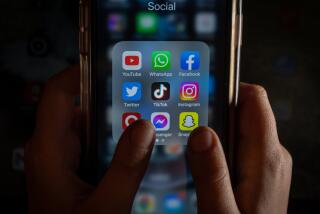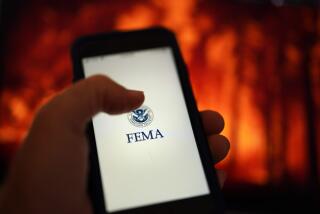FDA to Call for Cautious Cellular Use : Technology: The agency will be urging consumers to avoid excessive exposure to portable phones and their antennas. Current research cannot rule out a link to brain cancer.
- Share via
A U.S. Food and Drug Administration official told Congress on Tuesday that the agency will soon issue its first advisory on cellular phones amid continuing concerns that the devices emit unsafe levels of radiation.
In the agency’s first public comment since a lawsuit alleged that a Florida woman’s fatal brain cancer was caused by her portable phone, an FDA official said the advisory will caution consumers against excessive use of cellular phones and unnecessary exposure to the devices’ antennas.
At the same time, a representative of the National Cancer Institute said it will review U.S. brain cancer cases to determine if they reveal any link to cellular phone use.
The comments came at a congressional hearing on whether the devices, used by more than 10 million Americans, pose a potential health hazard.
In a move unrelated to the Florida case, users of cellular phones said Tuesday that they filed a class-action suit in Chicago against Motorola Inc. and Mitsubishi Electronics Corp., two major manufacturers, charging an alleged failure to test phones for potentially harmful radio waves.
They also allege that the manufacturers failed to warn phone users that they may be exposed to allegedly harmful or lethal doses of radio waves.
Experts at Tuesday’s congressional hearing told lawmakers that, while no conclusive proof exists to label portable cellular phones a safety risk, the possibility cannot be ruled out because of a lack of research on the subject.
They joined the cellular telephone industry in urging that research be undertaken as quickly as possible to resolve an issue that threatens to undermine public confidence and delay deployment of the next generation of hand-held wireless communication systems.
“There is no proof that there is a cancer threat from these phones,” Mays Swycord, chief of the FDA’s radiation biology branch, told a House energy and commerce subcommittee hearing.
*
However, Swycord said that because preliminary research suggests a possible link between cancer and microwave radiation similar to that emitted by cellular phones, the FDA will offer advice for consumers concerned about safety risks.
The FDA will be recommending that cellular users not talk on their phones for hours every day. For even greater safety, the FDA is recommending use of cellular phone models whose antennas are mounted outside the car, not the portable or pocket-sized versions that have become popular in the last 18 months.
“Shorter exposure is always better,” said Dr. David Klefman of the Environmental Protection Agency. “We say people don’t need to stay two hours on a cellular phone.”
Klefman said the EPA will have a workshop in April on radio frequencies and will have data available by the end of the year.






